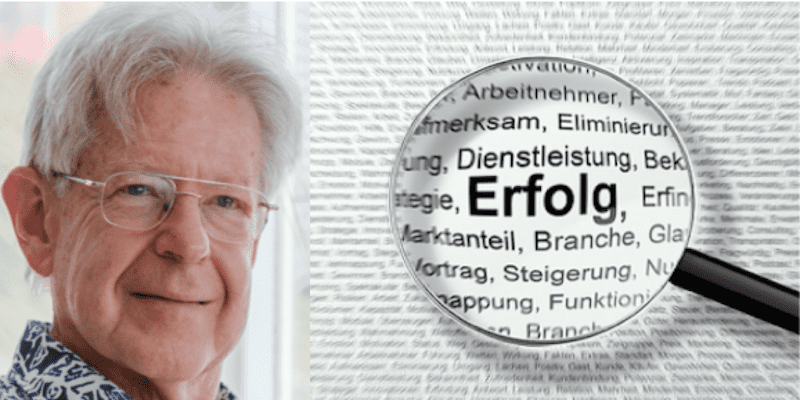

Sprachlupe: Jeden Tag begrüßt die Sprachforscherin
Daniel Goldstein / 2.12.2023
Linguistics without blinders: Professor Christa Dürscheid from Zurich presents her observations on everyday German. Do you feel like having a grammar espresso or a vocabulary bedtime snack? You can get one or the other fresh from an academic source every day: from linguistics professor Christa Dürscheid, who is originally from Germany and has been teaching in Zurich since 2002. For over three years now, she has been sharing short observations or hints on Twitter, always good for a smile or a furrowed brow. The latter is already threatened when you want to look up the now-called X platform: it only opens if you satisfy its data hunger to some extent. You can find the professor’s calendar notes more discreetly on Facebook and Instagram by searching for her name. But the additional links that often appear on the depicted notes do not work. When I looked it up on 27.11., I immediately came across the affirmation „genau“ (exactly). I had already noticed that people now say it to themselves (Sprachlupe, 29.7.). But now I learn that in conversation, „you need a different word if you want to explicitly agree: *absolut*“. And I see the beginning of a scientific paper by Peter Auer titled „Genau! Der auto-reflexive Dialog als Motor der Entwicklung von Diskursmarkern“ (Exactly! The auto-reflexive dialogue as a driver of the development of discourse markers). Clicking doesn’t help here, but if you’re not deterred by the title, you can find the free PDF with the help of a search engine. If you prefer it shorter, click above the image into the text and find the comment from „DvH“: „it really annoys me – I GET SO ANGRY WHEN SOMEONE SAYS ‚GENAU‘ TO THEMSELVES – AS A PUNCTUATION MARK!!!“ Until the Rhine separates us „Getting angry“ – that would be a case for Dürscheid, because with her knowledgeable ears, she pays attention to how people speak in different regions. The phrase „to get (really) angry“ is widespread – but hardly in Switzerland. When I briefly looked back in the professor’s calendar, I didn’t come across this example, but I did come across a thick cloud of words that pile up on the north side of the Rhine: Dürscheid writes about it: „There are words that are mainly used in Germany. Many of them also appear in novels set in Switzerland or Austria and written by Swiss or Austrian authors. Why? Are such words out of place here?“ I understand the question purely rhetorically, especially since I’m currently reading the crime novel „Wölfe in Bern“ (Wolves in Bern). In this city, there are supposedly „Bürgersteige“ (sidewalks). Unlike in the random placement shown, the Digital Dictionary (right column there) shows that sidewalks are mainly found further north; in the south and in Austria, they are often called Gehsteige. However, sidewalks have become rare outside of Switzerland and southern Germany. The small copyright notice at the bottom of the image leads to information that author Bettina Rimensberger is working on a dissertation: „Diatopische Variation in der Belletristik. Schweizer und österreichische Texte der Gegenwartsliteratur im Vergleich“ (Diachronic variation in literature. Swiss and Austrian texts of contemporary literature in comparison). „Diatopisch“ refers to geographical dispersion. Her pointing finger does not admonish, it shows that there are regional peculiarities not only in vocabulary but also in grammar. This explains Dürscheid’s X name @variantengra, which unfolds into „Variantengrammatik“ (variant grammar). This was an international project that Dürscheid supervised as the Swiss contribution. The result is an online reference work that provides information on many controversial or unclear cases: Does a certain expression belong to the standard language in a certain area of the German-speaking region, is it accepted in non-dialect newspaper texts, for example? The answers usually exceed the length of a tweet, but some examples can also be found in recent X entries, such as on 11.11.: „‚Ende Monat‘ (end of the month)? In Switzerland and Liechtenstein, this construction is completely inconspicuous (analogous to ‚Ende Mai‘ (end of May)).“ If you want to know more, you will find it in the Variantengrammatik. „Inconspicuous“ is a keyword for how Dürscheid approaches regional differences: observant, not judgmental or even instructive – and certainly not with the widespread view here that only „the way it is in Germany“ is correct German. Her daily language greetings do not provide a reason to „get angry“ – but often to scratch your head, because there is often a question that you have to find the answer to yourself. This was the case at the beginning of my sample: „What do young people understand by ‚mausig‘?“ or „How do children address their grandparents? With Oma, Opa, Grosie, Großpapi?“ At least there is a link, but it does not lead to the answer, but to a treatise on other aspects of addressing family members. And then you know who to ask
Original Artikel Teaser
Sprachlupe: Und täglich grüsst die Sprachforscherin
Daniel Goldstein / 2.12.2023 Linguistik ohne Scheuklappen: Die Zürcher Professorin Christa Dürscheid präsentiert ihre Beobachtungen zum Deutsch im Alltag. Haben Sie Lust auf einen Grammatik-Espresso oder ein Wortschatz-Bettmümpfeli? Das eine oder das andere gibt’s Tag für Tag frisch ab akademischer Quelle: von der aus Deutschland stammenden, seit 2002 in Zürich lehrenden Linguistik-Professorin Christa Dürscheid. Sie tischt seit gut drei Jahren auf Twitter kurze Beobachtungen oder Hinweise auf, immer für ein Schmunzeln oder Stirnrunzeln gut. Letzteres droht bereits, wenn man auf der jetzt X genannten Plattform nachschauen will: Sie öffnet sich nur noch, wenn man ihre Datengier ein Stück weit stillt. Etwas diskreter kommt man auf Facebook und Instagram zu den Kalenderzetteln der Professorin, wenn man ihren Namen in die Suche
Details zu Sprachlupe: Und täglich grüsst die Sprachforscherin







